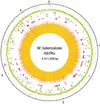Mycobacterium tuberculosis pathogenesis and molecular determinants of virulence
- PMID: 12857778
- PMCID: PMC164219
- DOI: 10.1128/CMR.16.3.463-496.2003
Mycobacterium tuberculosis pathogenesis and molecular determinants of virulence
Abstract
Tuberculosis (TB), one of the oldest known human diseases. is still is one of the major causes of mortality, since two million people die each year from this malady. TB has many manifestations, affecting bone, the central nervous system, and many other organ systems, but it is primarily a pulmonary disease that is initiated by the deposition of Mycobacterium tuberculosis, contained in aerosol droplets, onto lung alveolar surfaces. From this point, the progression of the disease can have several outcomes, determined largely by the response of the host immune system. The efficacy of this response is affected by intrinsic factors such as the genetics of the immune system as well as extrinsic factors, e.g., insults to the immune system and the nutritional and physiological state of the host. In addition, the pathogen may play a role in disease progression since some M. tuberculosis strains are reportedly more virulent than others, as defined by increased transmissibility as well as being associated with higher morbidity and mortality in infected individuals. Despite the widespread use of an attenuated live vaccine and several antibiotics, there is more TB than ever before, requiring new vaccines and drugs and more specific and rapid diagnostics. Researchers are utilizing information obtained from the complete sequence of the M. tuberculosis genome and from new genetic and physiological methods to identify targets in M. tuberculosis that will aid in the development of these sorely needed antitubercular agents.
Figures

References
-
- Alland, D., I. Kramnik, T. R. Weisbrod, L. Otsubo, R. Cerny, L. P. Miller, W. R. Jacobs, Jr., and B. R. Bloom. 1998. Identification of differentially expressed mRNA in prokaryotic organisms by customized amplification libraries (DECAL): the effect of isoniazid on gene expression in Mycobacterium tuberculosis. Proc. Natl. Acad.Sci. USA 95: 13227-13232. - PMC - PubMed
-
- Andersen, P. 2002. TB vaccines: progress and problems. Trends Immunol 22: 160-168. - PubMed
Publication types
MeSH terms
Substances
Grants and funding
LinkOut - more resources
Full Text Sources
Other Literature Sources

